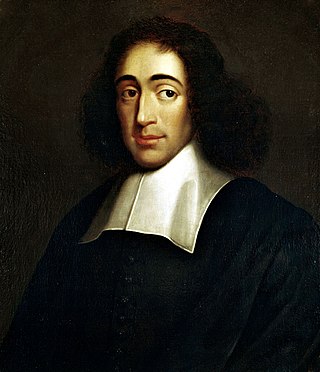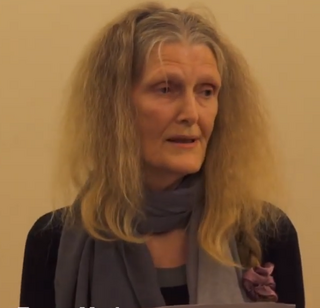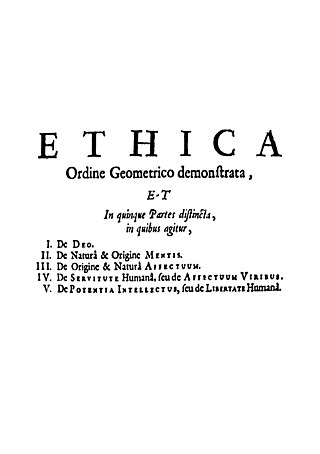Related Research Articles

Baruch (de) Spinoza, also known under his Latinized pen name Benedictus de Spinoza, was a philosopher of Portuguese-Jewish origin. As a forerunner of the Age of Reason, Spinoza significantly influenced modern biblical criticism, 17th-century Rationalism, and contemporary conceptions of the self and the universe, establishing himself as one of the most important and radical philosophers of the early modern period. He was influenced by Stoicism, Maimonides, Niccolò Machiavelli, René Descartes, Thomas Hobbes, and a variety of heterodox Christian thinkers of his day.
In philosophy, rationalism is the epistemological view that "regards reason as the chief source and test of knowledge" or "any view appealing to reason as a source of knowledge or justification", often in contrast to other possible sources of knowledge such as faith, tradition, or sensory experience. More formally, rationalism is defined as a methodology or a theory "in which the criterion of truth is not sensory but intellectual and deductive".

Elisabeth of the Palatinate, also known as Elisabeth of Bohemia, Princess Elisabeth of the Palatinate, or Princess-Abbess of Herford Abbey, was the eldest daughter of Frederick V, Elector Palatine, and Elizabeth Stuart. Elisabeth of the Palatinate was a philosopher best known for her correspondence with René Descartes. She was critical of Descartes' dualistic metaphysics and her work anticipated the metaphysical concerns of later philosophers.

Freya Mathews is an Australian environmental philosopher whose main work has been in the areas of ecological metaphysics and panpsychism. Her current special interests are in ecological civilization; indigenous perspectives on "sustainability" and how these perspectives may be adapted to the context of contemporary global society; panpsychism and critique of the metaphysics of modernity; and wildlife ethics and rewilding in the context of the Anthropocene.

Ethics, Demonstrated in Geometrical Order, usually known as the Ethics, is a philosophical treatise written in Latin by Baruch Spinoza. It was written between 1661 and 1675 and was first published posthumously in 1677.
The ethics of care is a normative ethical theory that holds that moral action centers on interpersonal relationships and care or benevolence as a virtue. EoC is one of a cluster of normative ethical theories that were developed by some feminists and environmentalists since the 1980s. While consequentialist and deontological ethical theories emphasize generalizable standards and impartiality, ethics of care emphasize the importance of response to the individual. The distinction between the general and the individual is reflected in their different moral questions: "what is just?" versus "how to respond?" Carol Gilligan, who is considered the originator of the ethics of care, criticized the application of generalized standards as "morally problematic, since it breeds moral blindness or indifference".
Women have made significant contributions to philosophy throughout the history of the discipline. Ancient examples include Maitreyi, Gargi Vachaknavi, Hipparchia of Maroneia and Arete of Cyrene. Some women philosophers were accepted during the medieval and modern eras, but none became part of the Western canon until the 20th and 21st century, when some sources indicate that Susanne Langer, G.E.M. Anscombe, Hannah Arendt and Simone de Beauvoir entered the canon.

In the philosophy of Baruch Spinoza, conatus is an innate inclination of a thing to continue to exist and enhance itself. This thing may be mind, matter, or a combination of both, and is often associated with God's will in a pantheist view of nature. The conatus may refer to the instinctive will to live of living organisms or to various metaphysical theories of motion and inertia. Today, conatus is rarely used in the technical sense, since classical mechanics uses concepts such as inertia and conservation of momentum that have superseded it. It has, however, been a notable influence on later thinkers such as Arthur Schopenhauer and Friedrich Nietzsche.
Steven Mitchell Nadler is an American academic and philosopher specializing in 17th-century philosophy. He is Vilas Research Professor and the William H. Hay II Professor of Philosophy, and was Max and Frieda Weinstein-Bascom Professor of Jewish Studies at the University of Wisconsin–Madison. He is also director of their Institute for Research in the Humanities.
Heidi M. Ravven is the Bates and Benjamin Professor of Classical and Religious Studies at Hamilton College, where she has taught her specialization, Jewish Philosophy, and general Jewish Studies since 1983. She is a Fellow in Neurophilosophy of the Integrative Neurosciences Research Program, which is co-directed by Vilayanur Ramachandran and Kjell Fuxe. She has been appointed Visiting Professor of Philosophy in the School of Marxism at Northeast Normal University, Changchun, China, for 2017-20.
Sandra Lee Bartky was a professor of philosophy and gender studies at the University of Illinois at Chicago. Her main research areas were feminism and phenomenology. Her notable contributions to the field of feminist philosophy include the article, "Toward a Phenomenology of Feminist Consciousness". Sandra Lee Bartky died on October 17, 2016, at her home in Saugatuck, Michigan at age 81.

Margaret Dauler Wilson was an American philosopher and a professor of philosophy at Princeton University between 1970 and 1998.
Hilde Lindemann is an American philosophy professor and bioethicist and emerita professor at Michigan State University. Lindemann earned her B.A. in German language and literature in 1969 at the University of Georgia. Lindemann also earned her M.A. in theatre history and dramatic literature, in 1972, at the University of Georgia. Lindemann began her career as a copyeditor for several universities. She then moved on to a job at the Hastings Center in New York City, an institute focused on bioethics research, and co-authored book The Patient in the Family, with James Lindemann Nelson, before deciding to earn a Ph.D. in philosophy at Fordham University in 2000. Previously, she taught at the University of Tennessee and Vassar College and served as the associate editor of the Hastings Center Report (1990–95). Lindemann usually teaches courses on feminist philosophy, identity and agency, naturalized bioethics, and narrative approaches to bioethics at Michigan State University.

The Man of Reason: "Male" and "Female" in Western Philosophy is a book about the association between maleness and reason in western philosophy by the Australian philosopher Genevieve Lloyd. The work received positive reviews. It has been called a twentieth century classic of feminist thought, and is widely read in the Nordic countries.

Amélie Oksenberg Rorty was a Belgian-born American philosopher known for her work in the philosophy of mind, history of philosophy, and moral philosophy.
Susan James is a British professor of philosophy at Birkbeck College London. She has previously taught at the University of Connecticut and the University of Cambridge. She is well known for her work on the history of seventeenth and eighteenth century philosophy.
Feminist metaphysics aims to question how inquiries and answers in the field of metaphysics have supported sexism. Feminist metaphysics overlaps with fields such as the philosophy of mind and philosophy of self. Feminist metaphysicians such as Sally Haslanger, Ásta, and Judith Butler have sought to explain the nature of gender in the interest of advancing feminist goals.
Moira Gatens is an Australian academic feminist philosopher and current Challis Professor of Philosophy at the University of Sydney. She previously held the Spinoza Chair at the University of Amsterdam, Netherlands.
Dutch philosophy is a broad branch of philosophy that discusses the contributions of Dutch philosophers to the discourse of Western philosophy and Renaissance philosophy. The philosophy, as its own entity, arose in the 16th and 17th centuries through the philosophical studies of Desiderius Erasmus and Baruch Spinoza. The adoption of the humanistic perspective by Erasmus, despite his Christian background, and rational but theocentric perspective expounded by Spinoza, supported each of these philosopher's works. In general, the philosophy revolved around acknowledging the reality of human self-determination and rational thought rather than focusing on traditional ideals of fatalism and virtue raised in Christianity. The roots of philosophical frameworks like the mind-body dualism and monism debate can also be traced to Dutch philosophy, which is attributed to 17th century philosopher René Descartes. Descartes was both a mathematician and philosopher during the Dutch Golden Age, despite being from the Kingdom of France. Modern Dutch philosophers like D.H. Th. Vollenhoven provided critical analyses on the dichotomy between dualism and monism.
Catriona Alice Mackenzie is an Australian philosopher. She is professor emerita of philosophy at Macquarie University and a Fellow of the Australian Academy of the Humanities. Mackenzie has published in moral and political philosophy, feminist philosophy and applied ethics.
References
- ↑ Lloyd, Genevieve (1941–) Encyclopedia of Philosophy Macmillan Reference USA, cited at BookRags(subscription required)
- ↑ "Fellow Profile: Genevieve Lloyd". Australian Academy of the Humanities. Retrieved 29 April 2024.
- ↑ Lloyd, Genevieve (1979). "The Man of Reason". Metaphilosophy. 10 (1): 18–37. Retrieved 3 May 2023.